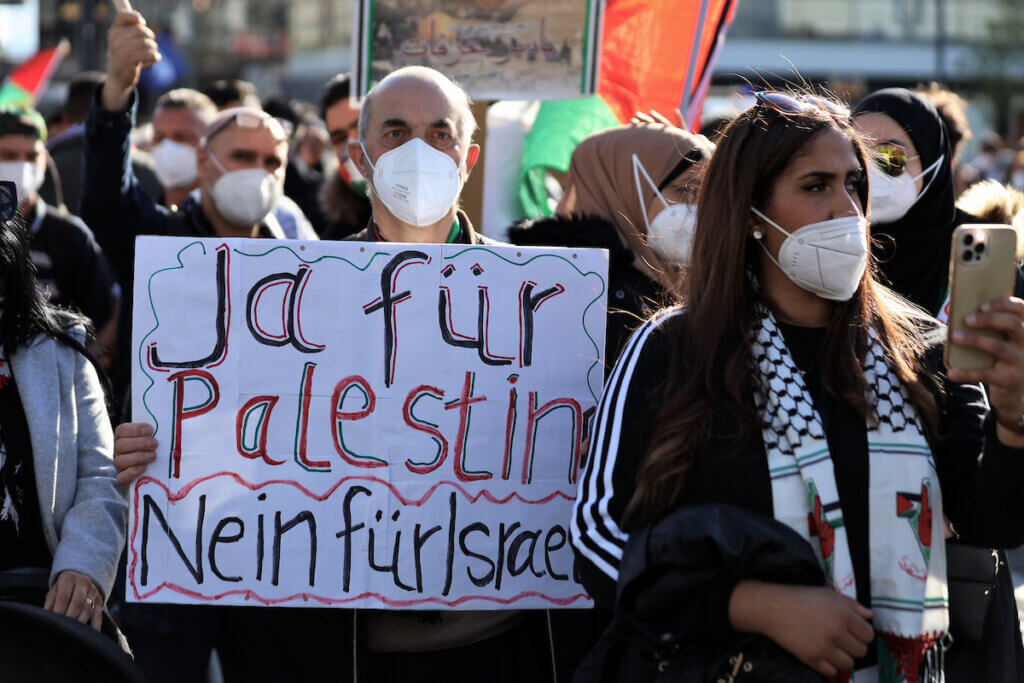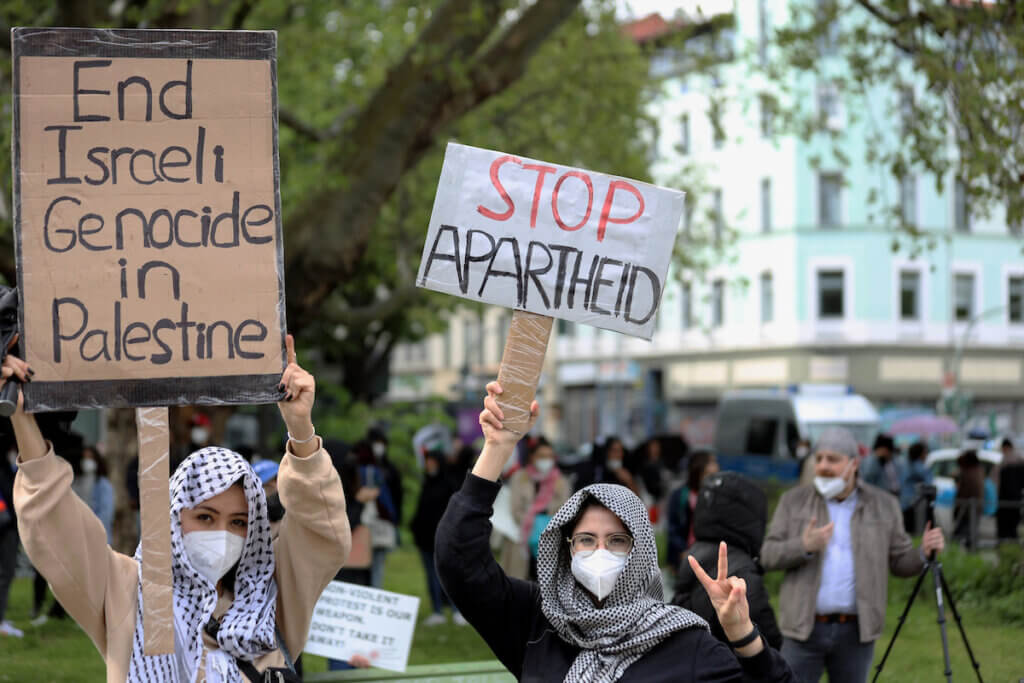I was six years old when I first experienced the meaning of being a Palestinian descendant growing up in Germany. It was the day when my primary school teacher asked me where my mother was from. Innocently I replied, “from Palestine.” I immediately saw a rapid change in her behavior. Enraged and appalled, she raised her voice at me, demanding that I “never spread such lies again,” because according to her “Palestine does not exist.” Little did I know that such occurrences would follow me during my entire upbringing in Germany, whenever I revealed my Palestinian identity.
Whether at school, at work, or during day-to-day activities such as entering a café or nightclub, I have often been denied entry for wearing my keffiyeh as this piece of clothing would cause “distress for other customers.” Several Palestinian-Germans have told me of similar experiences that also started in their early childhood. Teachers would stigmatize them openly and forbid them to speak about their identity. Necklaces with the shape of the Palestinian map are often strictly forbidden at school or work, as is the keffiyeh. The explanation being that these items are “antisemitic” and shall not be worn in German public spaces. Students of Palestinian descent have also shared that they are often too afraid to give presentations about their parents’ home country, because teachers would either constantly interrupt them when the Nakba is mentioned, or even prevent it in the first place. Occurrences like that are also seen in German universities, especially in International Relations and Social Sciences faculties. The silencing of Palestinian voices in Germany is ongoing and getting worse with time.
The past weeks were especially rough for many Palestinian-Germans. We were helpless as we watched Palestinian civilians get brutally attacked in the world’s biggest open-air-prison under Israeli siege, of which at least 65 of the murdered were children. Not only were we confronted with the ongoing violence on the ground of our parents’ home country, but we also had to witness Germany’s one-sided media reporting. ‘Hamas aggressively attacks Israel’ was a reoccurring narrative used by the biggest German news outlets. The German media barely reported on the 219 Palestinians killed but did not shy away from mentioning the ten victims on Israeli side in big bold letters on every landing page. When protests were held in different parts of Germany protestors faced immense police violence, especially in Berlin. Several videos circulated showing attacks on peaceful protestors, and even children, by German police forces. “I was terrified. I saw how they grabbed young men who were only holding up ‘Free Palestine’ signs from the crowd and beat them severely for no reason”, Dina. S, a protestor from Berlin told me. The media, in turn, reported the next day about “antisemitic protests” throughout Germany which was followed by several political debates about whether ‘immigrants bring antisemitism to Germany‘ – the country that ethnically cleansed over six million Jews during the Holocaust.

But it’s not only Palestinians that are suffering from Germany’s gaslighting when it comes to criticizing Israeli aggression: Jewish-Israelis who stand in solidarity with Palestinian human rights are also actively targeted and openly smeared. Several activists have shared with me that they have been called “self-hating-Jews” by German activists and even politicians. The German federal government commissioner on “Jewish Life in Germany and the Fight Against Antisemitism”, Felix Klein, recently accused Jewish Israeli activists who criticize Israeli Apartheid as being “insensitive towards the German past”. Jewish voices are also actively and systematically silenced by German academia, politicians, and media when they do not agree with Israel’s policies. This often follows with severe smear campaigns on Twitter and media outlets that openly ‘name & shame’ and even criminalize Israeli Jews who voice their criticism against Israel. As Dr. Stavit Sinai, a Jewish-Israeli sociologist living in Berlin, and a member of the “Humbold 3 trial” in 2019, explained to me:
“German authorities put us on trial and criminalized us for petty offenses (I got 30 days in jail) because we dared to speak up against Israeli crimes against humanity while confronting an Israeli Apartheid representative who was involved in the 2014 massacre in Gaza. As documents show, this move was coordinated with Israeli officials (Yair Lapid, currently co-PM of Israel), the Berlin authorities, and Israeli media who was targeting us individually – all to oppress anti-Zionist and Anti-Apartheid dissent against the criminal race state of Israel. Ironically enough, our activism has only expanded after we used the trial to expose Israeli crimes. I do not concern myself with ill-will accusations of antisemitism against people who stand up against Israeli brutality”.
Being a Palestinian-German means carrying a double-burden: the burden of systemic racism and the burden of Germany’s dark past, which has transformed into anti-Palestinian racism over the years. Fear of exclusion, discrimination, and loss of career opportunities are just a few of the countless concerted efforts by Germany to prevent the dissent of Palestinian and Jewish citizens who speak out against a stark reality: Germany’s complicity in Israeli Apartheid policies and crimes against humanity.

So where are the Palestinian voices in mainstream media?
Mondoweiss covers the full picture of the struggle for justice in Palestine. Read by tens of thousands of people each month, our truth-telling journalism is an essential counterweight to the propaganda that passes for news in mainstream and legacy media.
Our news and analysis is available to everyone – which is why we need your support. Please contribute so that we can continue to raise the voices of those who advocate for the rights of Palestinians to live in dignity and peace.
Palestinians today are struggling for their lives as mainstream media turns away. Please support journalism that amplifies the urgent voices calling for freedom and justice in Palestine.
 RSS Feed
RSS Feed















 June 11th, 2021
June 11th, 2021  Awake Goy
Awake Goy  Posted in
Posted in  Tags:
Tags: 













